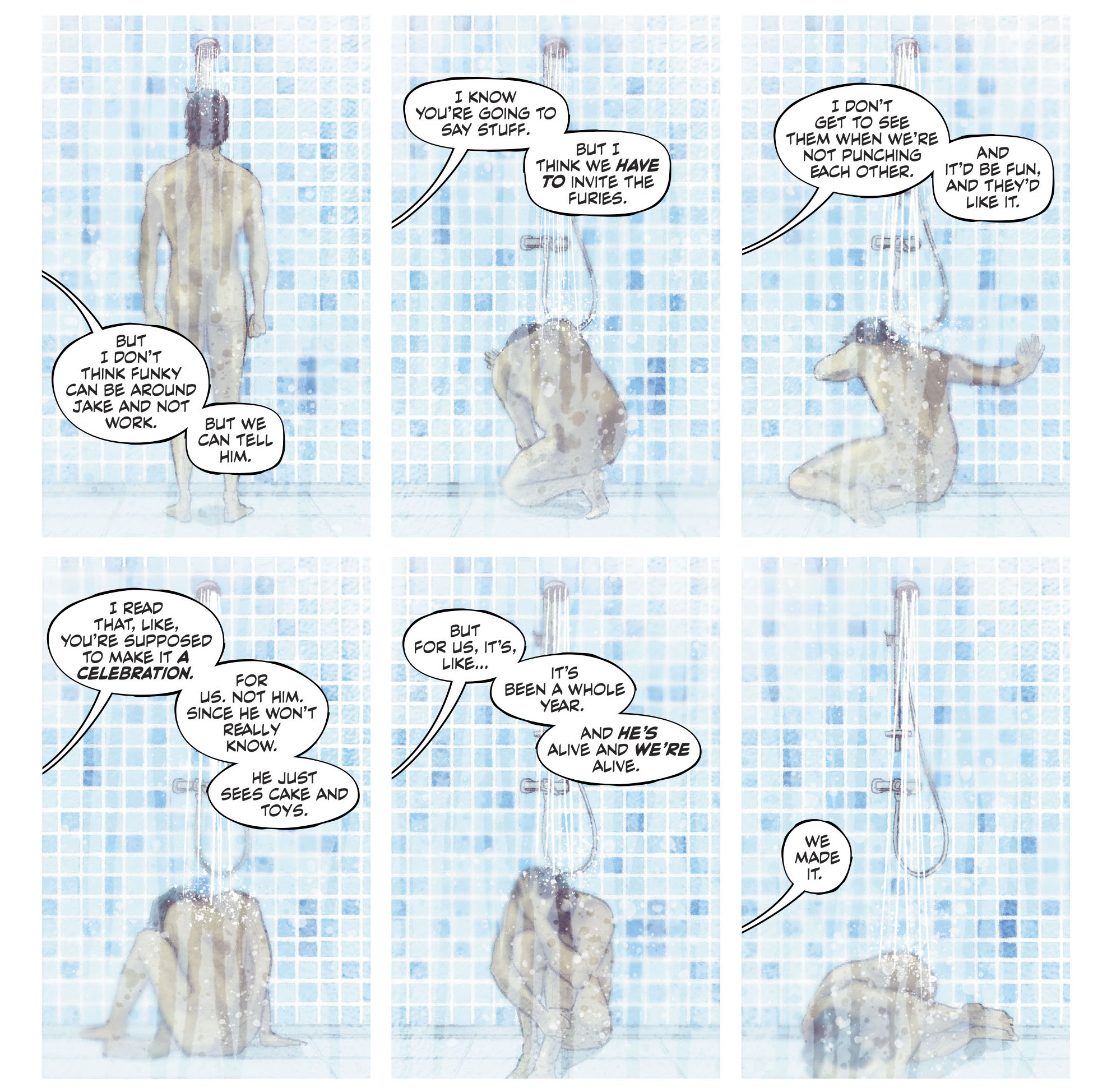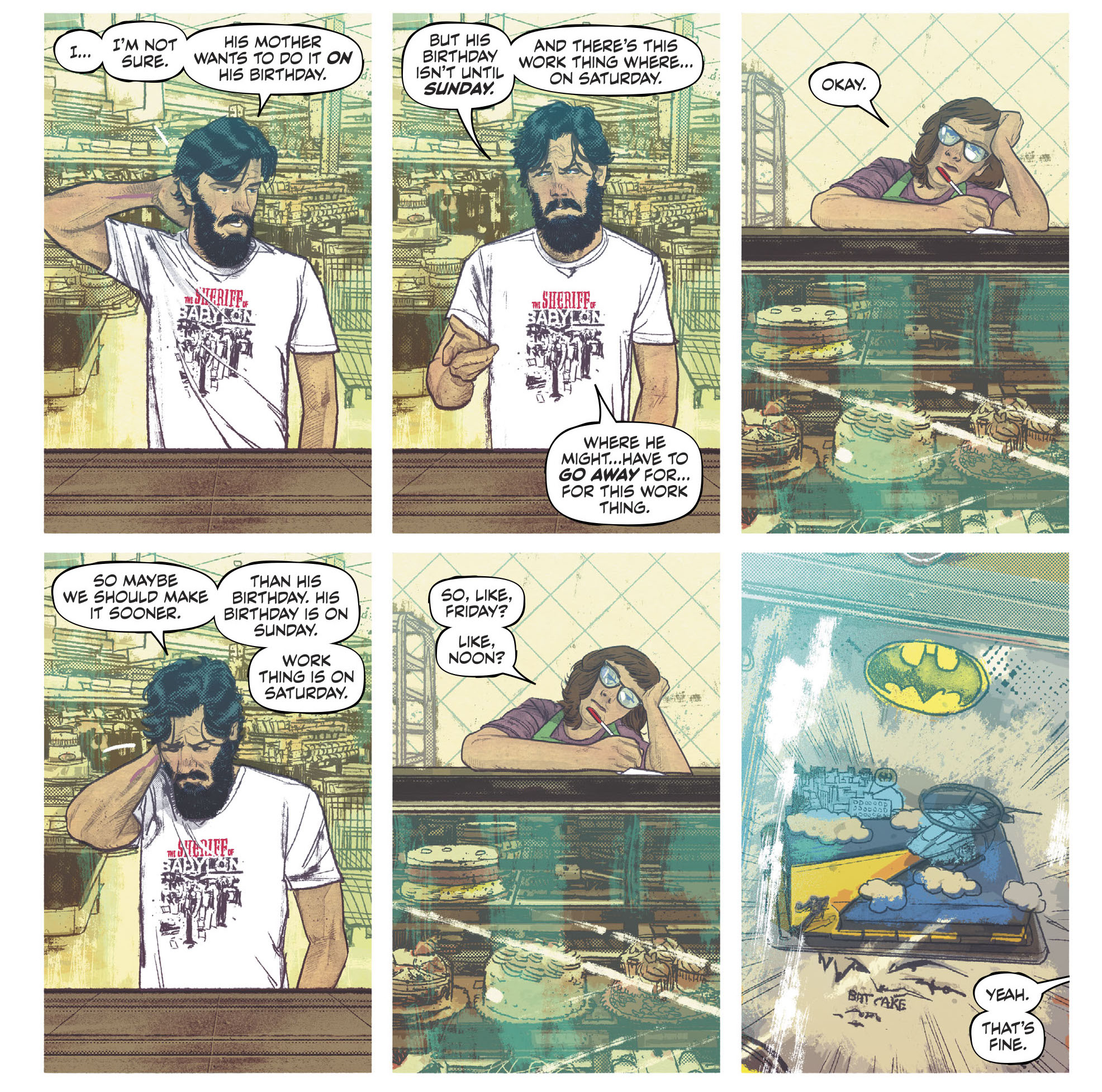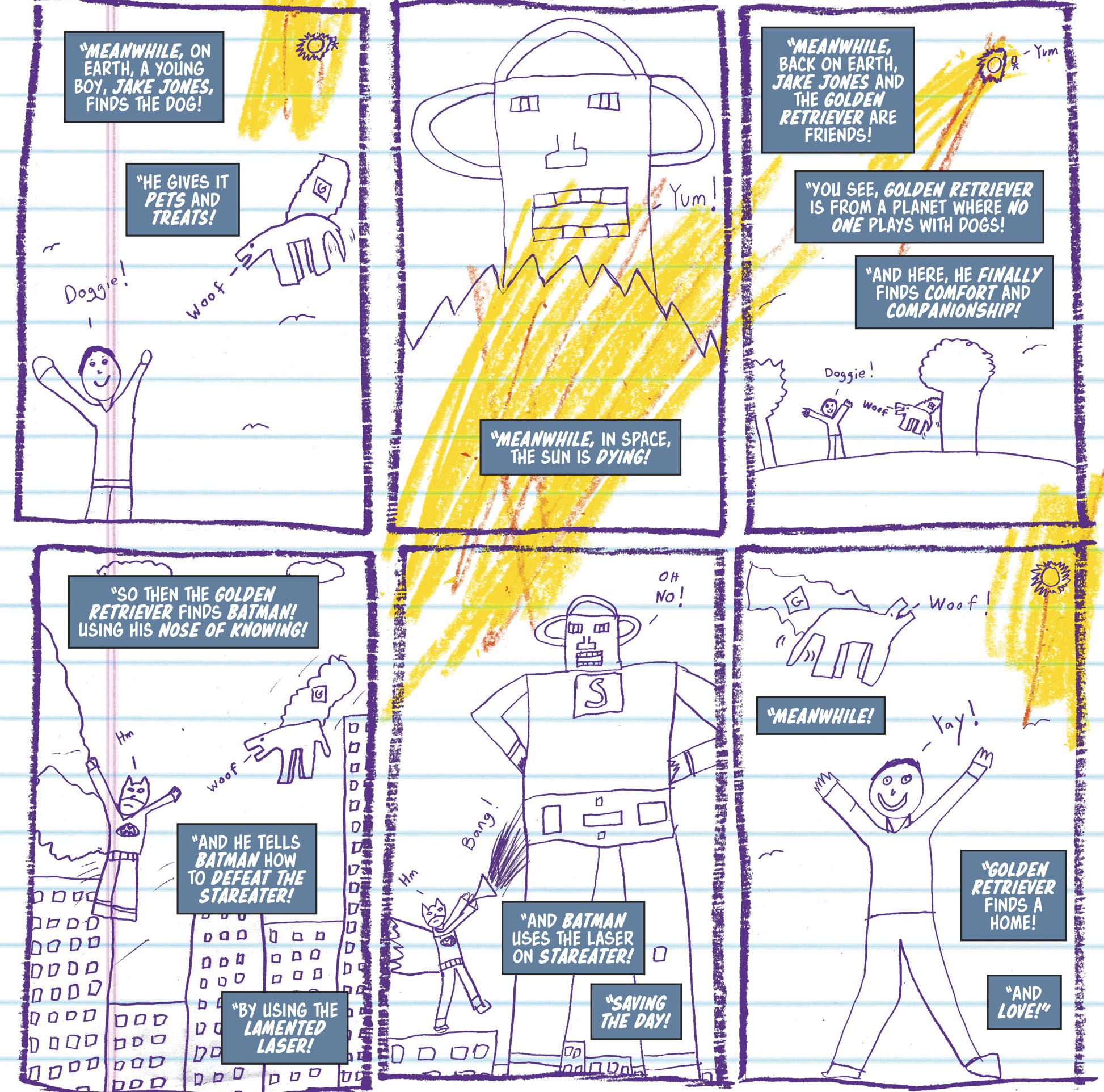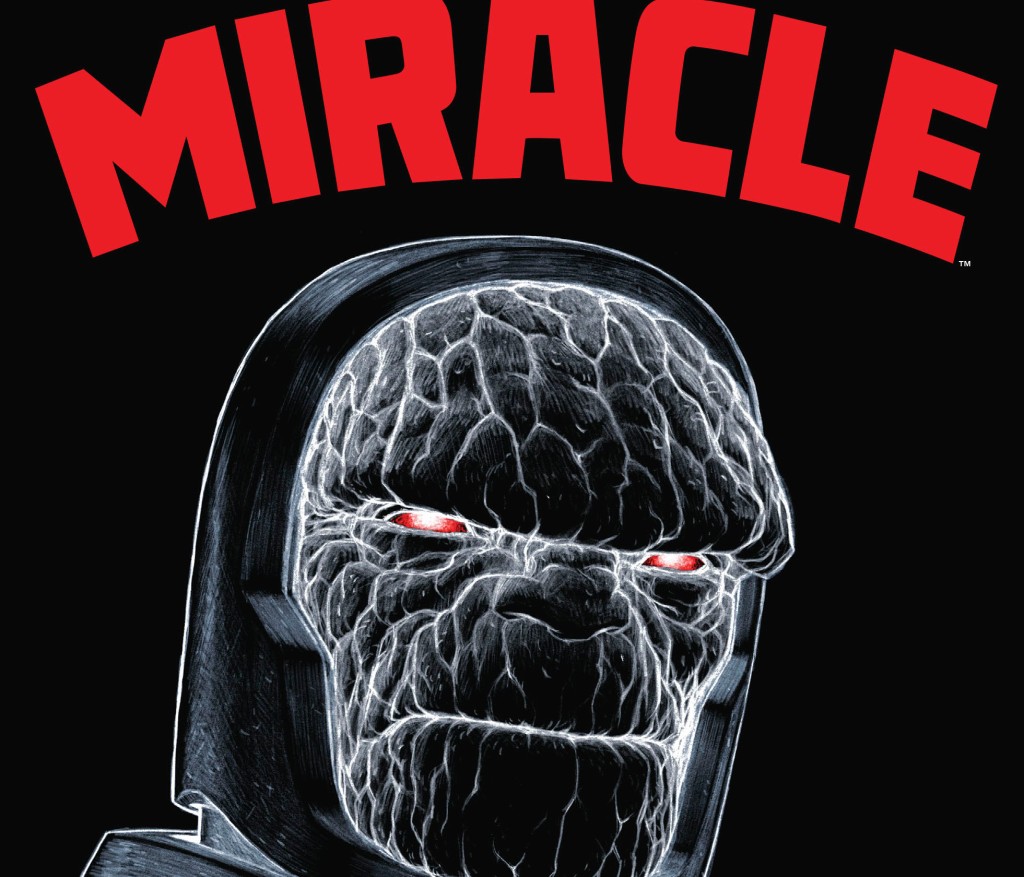Writer: Tom Taylor
Artist: Mitch Gerads
Colors: Mitch Gerads
Cover: Nick Derington
Published: August 1, 2018
*Content warning for a brief mention of self harm in this discussion.
As a child Scott Free was given by his father, The Highfather of New Genesis, to Darkseid to be raised on Apokolips. In return The Highfather raised one of Darkseid’s sons (Orion) and this exchange signaled the end of an ongoing war between New Genesis and Apokolips. This is nearly the same proposition that Darkseid offered Barda and Scott at the end of issue #9. If they allow their son Jake to be raised on Apokolips they can dictate terms of the cease fire. This is a low key issue that serves mostly as an opportunity for reflection as the two of them try to figure this out. There are some interesting philosophical/ethical/emotional considerations that add some needed context to previous issues that seemed to revel in the horror of the ongoing war. The first scene is Scott closing out a long night of drinking with Booster Gold and Blue Beetle. Here, and in subsequent scenes, Scott oscillates from confused to stubborn to crying in the shower. One of the final scenes between him and Barda contrasts how they’ve both handled the past couple of days and way we’ve seen their relationship operating over the last nine issues. But before that, let’s get into the conversations Scott has that frame how he’s thinking about this.
There are a number of one or two pages scenes that show Scott handling/struggling to handle the weight of what he must do as he goes about his life. He tries to drink it away with his friends, he breaks down in the shower, and resorts to oracles and space technology when he asks the Mother Box to interpret a prophecy from the Ablazed Oracle. He’s searching for something or someone to tell him how to deal with an impossible choice. The first ‘substantive’ advice that he gets comes from the cashier at the party supply store. Scott gives him the rough details of his dilemma, and the clerk tells him to that the whole point of life is to maximize the amount of happiness for the largest number of people. He says that it’s sort of an equation type thing (maybe an anti-life equation?). The clerk lays out a classical utilitarian approach to morality. Jeremy Bentham and John Stuart Mill were two philosophers who contributed greatly to utilitarian ethical thinking and were concerned with how this way of thinking could be used to bring about legal and social reform. If you think a law or a social norm is wrong or corrupt, what is the framework by which you arrive at that judgement? For them utilitarianism was that framework, if a law didn’t work to maximize happiness/utility/the good (these concepts are roughly interchangeable), it had no use and ought to be changed. In the context of Scott’s decision he has to decide whether he should relinquish the raising of his son to Darkseid and end the war, or continue the war and keep his son. In the context of utilitarianism the right action would be to end the war and save thousands of lives even if three might be ruined (Barda, Scott, their son Jacob). Utilitarianism isn’t particularly concerned with how a decision affects the agent making it, only whether the effects tangibly increase or decrease happiness. And in this case the results seem obvious.

The way we’ve been discussing the plot and themes of this issue betray a critical point for the consideration of the next scene. We’ve been talking about this decision as Scott’s, as the issue is focused on him and he holds the most agency, even though he is not the only one affected. This leads directly into the next framework Scott is given. The issue focuses on Scotts burden and his emotional reaction, and relegates Barda. She’s in about half of the scenes and has the biggest impact on Scott’s final plan, but the focus of the issue isn’t very concerned with her emotional reaction instead prioritizing Scott’s thoughts and emotions (which is emblematic of the whole series). The moment between Barda and Scott follows after the discussion of utilitarianism and he is ready to give up their son for the balance of happiness. Barda (rightly) is having none of it. She throws a wrench in the utilitarian algebra by asking Scott if he’s willing to let the cycle of suffering continue. Scott wants to forget that just over a year ago Barda found him bleeding from slit wrists on a bathroom floor, but she doesn’t have the privilege of forgetting. It would be a stretch to say that we understand what’s going on in Scott’s head, but we have a much better understanding of him than Barda. He gets to be complicated and messy while she is less defined. She doesn’t get to be inconsistent. Both of these people are suffering trauma from their past (remember their decayed reflections in the Mirror of Goodness last issue), and Barda does not want this fate, the psychological effects of being raised on Apokolips, to belong to their son. Throughout the whole scene Barda calls Scott on his s***. She demands to know why his needs have been prioritized and she’s left being responsible and consistent? Was he was trying to escape from her when he slit his wrists? Why does he get to be conflicted, and she’s left picking up after him, trying to make him whole. Scott has no answers for Barda, and there are none. This isn’t to say they don’t love each other, but they’re participating in a difficult and uneven relationship, and Barda wants something better for their son. He doesn’t have to be as messed up as them. The favorable reading of this scene (which I don’t think it deserves because I don’t know how self aware it is) interprets it as a commentary on how Barda’s emotional labor is not foregrounded the way Scott’s is, both in this issue and the series as a whole. The fallout from this scene and Barda not wanting to perpetuate suffering complicates the utilitarian approach. If they allow their child to be raised on Apokolips, who will he then hurt?

The final piece of advice that Scott receives is a story that his son told to Funky Flashman (the babysitter). In the story a flying dog scouts the universe to find planets for a huge robot to eat. When the dog finds earth he meets a boy who loves him causing the dog to want to save the planet. The dog tells Batman how to stop the robot, and Batman saves everyone.This story rather mirrors the plot of Marvel’s Silver Surfer, where the Silver Surfer works as the herald of Galactus Devourer of Worlds. When the surfer comes to earth to prepare it for Galactus, he meets the Fantastic Four and is convinced to turn on Galactus and save Earth. This (hang with me this might be a stretch) his tentative parallels to the Bible in chapter 18 of Genesis. This the story of Abraham and the city of Sodom which God has marked for destruction. In this chapter Abraham pleads with God to save the city even if he finds only ten righteous people. Each tale revolves around the idea that a place can be redeemed if it contains only a few good people, although what it means for Scott is more nebulous. Is he meant to consider that there might be good people on Apokolips who are worth ending the war and saving. This is tenuous but, maybe influences Scott and Barda’s final plan to kill Darkseid and rid Apokolips of his tyranny. Ultimately Scott heeds Barda and refuses to give their son up, rejecting the calculations of utilitarianism, or the outright compassion from his son’s story. Together he and Barda will try and find their own way through and give their son childhood they both missed.
This is a very dialogue heavy issue so Mitch Gerads does not have the opportunity to do some of his most dynamic work, but there are still some really nice touches and his art adds levity to a heavy issue. When Funky is relaying the story about the dog and the robot that eats worlds, those panels are drawn as if by Scott’s one year old son. It highlights that it comes from the imagination of a child and what they find important in the telling of this story, which is the yellow sun signifying earth, and the relationship between the dog and the boy. The other two standout moment are Scott’s interactions with the woman at the baker and the man at the party supply store. Scott is having an existential crisis and the woman is very bored, leaning her hand on her head as he looks at Batman cakes. The man at the store has this extremely puzzled look on his face when Scott doesn’t want to sign up for a reward card and receive ‘free money’. These are light touches but they show how, even though Scott has problems on an intergalactic level, he still functions down among the rest of us. With two issues left and a confrontation with Darkseid looking it’s going to be interesting to see what King and Gerads have in store.
(Subjective) Score out of 10: 7


